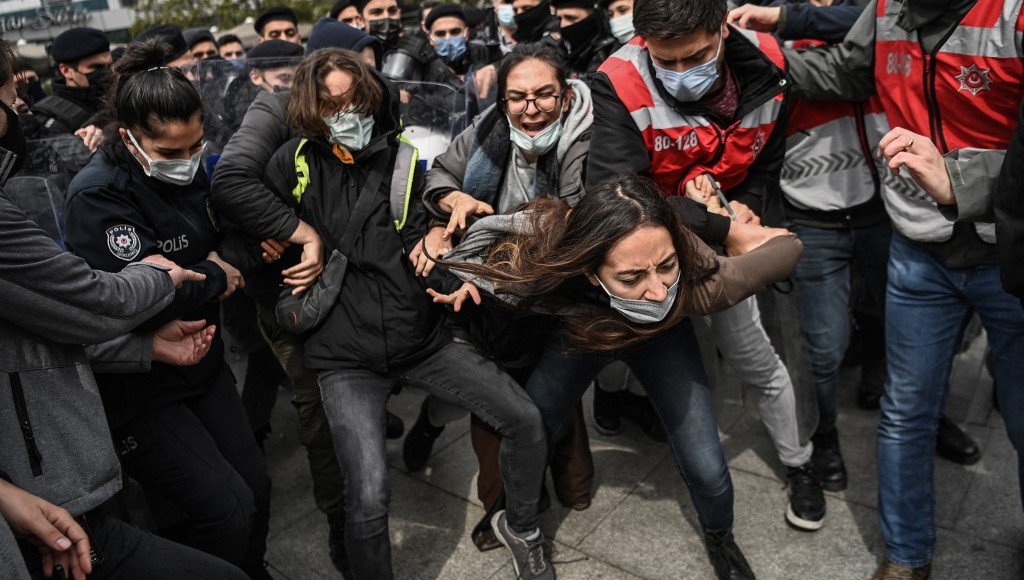Membership in an armed terrorist organization as defined in the Counterterrorism Law (TMK) and a controversial article of the Turkish Penal Code (TCK) have been used by Turkish courts to suppress the opposition during the time in power of the Justice and Development Party (AKP), according to a report released by the Arrested Lawyers Initiative, an advocacy groups defending the rights of lawyers, on Monday.
The group compiled its report based on judicial statistics published by the Directorate General of Judicial Records and Statistics, part of Turkey’s Justice Ministry.
Prosecutors have been increasingly using terrorism charges during the last six years, the report showed.
Turkish prosecutors launched 8,416 investigations under Article 314 of the TCK in 2013, but the number of investigations initiated under the same article skyrocketed in the wake of a coup attempt on July 15, 2016, as 146,731 investigations were carried out in 2017, with the total number of investigations launched on terrorism charges in eight years rising to 426,01, the report said.
Yearly breakdown of investigations launched under Article 314 of the TCK since 2013:
| Year | Investigations under Article 314 of the TCK |
| 2013 | 8,416 |
| 2014 | 20,998 |
| 2015 | 15,218 |
| 2016 | 30,766 |
| 2017 | 146,731 |
| 2018 | 115,753 |
| 2019 | 54,464 |
| 2020 | 33,885 |
| Total | 426,061 |
The advocacy group also noted that a similar trend was seen in the number of sentences handed down on terrorism charges, with more than 266,000 people sentenced to prison on these charges between 2016 and 2020.
Yearly breakdown of prison sentences handed down under Article 314 of the TCK since 2016:
| Year | Number of sentences under Article 314 of the TCK |
| 2016 | 4,949 |
| 2017 | 36,927 |
| 2018 | 108,412 |
| 2019 | 69,740 |
| 2020 | 46,783 |
| Total | 266,811 |
A recent Council of Europe (CoE) report said Turkey had the highest population of inmates convicted of terrorism, noting that of 30,524 inmates sentenced to prison on terrorism-related charges in CoE member countries, 29,827 were in prisons in Turkey.
In Turkey, terrorism is punishable under two different laws: TMK Law numbered 3713 and Article 314 of the TCK. Many articles of the TMK have been repealed by the Constitutional Court, but its fifth article is used to increase prison sentences handed down on terrorism charges by 50 percent. Establishing/leading a terrorist organization and membership in a terrorist organization are punishable under the first and second paragraphs of the TCK, respectively. Those charged with these offenses may be sentenced to prison terms ranging from 7.5 years to 22.5 years.
In many of its rulings regarding Turkey, the European Court of Human Rights (ECtHR) has criticized the lack of foreseeability of the TCK and TMK, noting that the laws in question lack any clear definition of an armed terrorist organization as well as legal descriptions and criteria for membership in such an organization, which paves the way for arbitrarily implementing provisions of the laws.
The ambiguity of penal provisions related to state security and terrorism gives judges and prosecutor wide latitude in construing unrelated offenses and even a critical stance or opposition as terrorism. Housewives, human rights advocates, journalists and dissident politicians have been arrested and jailed under these articles, particularly after the failed coup of July 2016.
The ruling AKP uses this ambiguity to silence the opposition, having the judicial institutions it controls send the groups or individuals it designates as dangerous to prison.
The Turkish government launched a crackdown on non-loyalist citizens in the aftermath of the failed coup following which hundreds of thousands of people have been subjected to legal proceedings under the pretext of an anti-coup fight.

